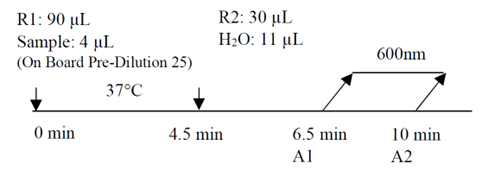Diazyme OxLDL Assay is based on latex enhanced immunoturbidimetric method. OxLDL molecules in the sample bind to the specific anti-OxLDL antibodies that are coated on latex particles, and which causes agglutination.
| Product | Catalog Number | Format |
|---|---|---|
| Kit | DZ566B-KY1 | R1/R2: 14 mL/ 44 mL Cal: 1 x 1 mL (Included with kit) |
| Control | DZ566B-CON | Con: 3 x 3 mL |
Product Features
- Specific for oxidized lysine residues on apoB100 of LDL-C
- Not LDL cholesterol level dependent, no direct correlation with LDL-C levels
- Overcomes the issue of ELISA based OxLDL assays with direct correlations to LDL-C levels
- Proportional to the amount of oxidized lysine residues on apoB100 of LDL-C
- Liquid stable reagents
- Available on clinical chemistry analyzers
Downloads
Assay Principle
Diazyme OxLDL Assay is based on latex enhanced immunoturbidimetric method. OxLDL molecules in the sample bind to the specific anti-OxLDL antibodies that are coated on latex particles, and which causes agglutination. The degree of the turbidity caused by agglutination can be measured optically and is proportional to the amount of OxLDL in the sample. The instrument calculates the OxLDL concentration of a patient specimen by interpolation of the obtained signal of a 5-point calibration curve.

Intended use
The Diazyme OxLDL Assay kit is intended to be used for the in vitro quantitative measurement of oxidized low-density lipoproteins (oxidized LDL) in human serum or plasma. Lipoprotein measurements are used in the diagnosis and treatment of lipid disorders (such as diabetes mellitus), atherosclerosis, and various liver and renal diseases.
Regulatory Status





